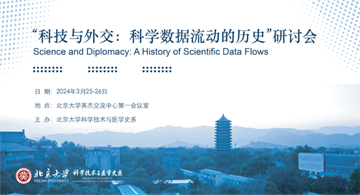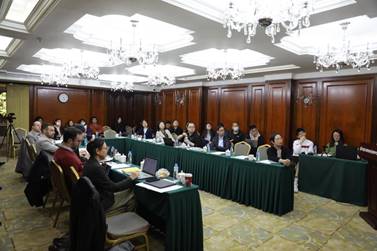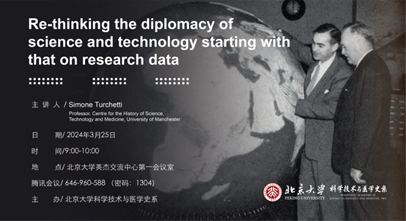
Seminar to Reflect the Scientific Data Held at Peking University
Academic seminar "Science and Diplomacy: A History of Scientific Data Flows" was held at the Peking University Overseas Exchange Center, on March 25-26, 2024, bringing together scholars in the history of science diplomacy from various research institutions in China and the University of Manchester in the United Kingdom, and it aimed at to offer a fresh perspective on the essence of science diplomacy through discussions on the historical international circulation of scientific data. The seminar was organized by the Department of History of Science, Technology, and Medicine (DHSTM) of Peking University, with funding support from the European Research Council project Neworld@a.
Consisted of a total of 13 academic presentations, 2 main themes, this academic gathering brought together a plethora of insightful theoretical observations and empirical studies. Seminar comprised presentations from six Neworld@a project members from the University of Manchester and Peking University, focusing on data diplomacy, and the other seven Chinese scholars, offering a broader perspective on science diplomacy.

Conference Site
Theme One: Historical Intersection of Scientific Data and Diplomacy
This theme showcased the interim achievements of the Neworld@a project, and presentations on data diplomacy primarily. Professor Simone Turchetti delivered the keynote address titled "Rethinking Science Diplomacy through the Lens of Scientific Data Diplomacy," He provided a comprehensive overview of the academic history and current research status of science diplomacy.Professor Turchetti also discussed the establishment history of the Science, Technology, and Diplomacy Committee (STAND) under the International Committee for the History of Science and Technology (ICHST), as well as the origins and implementation of the Neworld@a project. He argued that previous studies on science diplomacy often centered on specific diplomatic policy frameworks, thereby limiting our understanding of the essence of science diplomacy, and advocated for examining international affairs related to the infrastructure of scientific endeavors, including scientific data, to provide historical insights for contemporary science diplomacy.


Professor Simone Turchetti Delivering Keynotes
Dr. Gordon Barrett, a research associate at the Center for the History of Science, Technology, and Medicine at the University of Manchester, presented his research proposal focusing on the geopolitical dynamics and data sharing of the International Geophysical Year (IGY) program in the Asia-Pacific region during the Cold War era. Professor Aya Homei from the School of Arts, Languages, and Cultures at the University of Manchester introduced her research project on the history of seismic exchanges between China and Japan in the 1970s, with potential areas of interest including the role of seismic data in Sino-Japanese seismic exchanges.

Presenters of Theme One
Additionally, postdoctoral researcher Zhang Jingfei, doctoral student Hu Xiaoyue, and researcher Bo Erchen from Peking University presented their research progress and plans concentrating on the historical flow of seismic data and climate data.
Theme Two: The Historical Evolution of Science Diplomacy
The remaining seven speakers presented their respective research progress or findings on science diplomacy from different perspectives on this theme. Professor Fan Chunliang, a researcher at the Institute of Strategic Studies at the Chinese Academy of Sciences, examined the characteristics of China's science and technology diplomacy during different periods since the reform and opening-up from the perspective of the history of science and technology policy. Professor Chen Bo from the Department of History at East China Normal University introduced his research project on the role of the University of Michigan in the export of atomic energy technology in the United States. Assistant Professor Wu Bohao from the Department of History at Peking University discussed his research on technology transfer in the 1970s, focusing on both the transmission and communication of technology across Cold War blocs and intra-bloc technological exchanges, emphasizing a global perspective.
Wang Yuqi, a doctoral student at the Institute of Geology and Geophysics of the Chinese Academy of Sciences, examined global observations and records of auroras in different regions over millennia under various social and cultural backgrounds and the utilization of this historical data for modern scientific research. Associate Professor Su Jingjing from the School of Medical Humanities at Peking University used the example of the World Health Organization's certification of China's eradication of smallpox to explore the mutual influence between political relations and scientific standards. Postdoctoral fellow Tong Yichen from the School of Humanities at the University of Chinese Academy of Sciences and Associate Researcher Liu Jinyan from the Institute for the History of Natural Sciences at the Chinese Academy of Sciences focused on Sino-Soviet science and technology diplomacy in the 1950s. Tong Yichen discussed Chinese scientists' reactions to the changing political relations regarding the Lysenkoism theory during the Beijing Agricultural University's crop selection and breeding program. Liu Jinyan presented the achievements of Chinese scientists using advanced equipment at the Joint Institute for Nuclear Research in Dubna, Soviet Union, and the impact of strained Sino-Soviet relations on their work and the institute's international reputation, as well as its influence on China's subsequent nuclear weapons development efforts.

Presenters of Theme Two
Throughout the discussions, we witnessed how data diplomacy serves as a crucial entry point for understanding science diplomacy. The production, circulation, storage, and utilization of scientific data are intertwined with scientific infrastructure, knowledge production, technology transfer, and foreign policy, reflecting the multifaceted nature of science diplomacy. We hope that our research can provide practical insights and address real-world challenges.
Attachment: Program
Science and Diplomacy: A History of Scientific Data Flows
Program
Date:March 25-26,2024
Venue: Peking University
Host:Department of History of Science, Technology and Medicine, Peking University
March 25, Monday 9:00-17:50
Venue: Meeting room 1, Yingjie Overseas Exchange Center, Peking University
Moderator: Li ZHANG, Professor, Department of History of Science, Technology and Medicine, PKU
9:00-10:00 Keynote speech
- Simone Turchetti
Professor, Centre for the History of Science, Technology and Medicine, University of Manchester
Re-thinking the diplomacy of science and technology starting with that on research data
10:00-10:20 Discussion
10:20-10:30 Break
Moderator: Hao CHEN, Associate professor, Department of History of Science, Technology and Medicine, PKU
10:30-11:00 - Chunliang FAN
Research professor, Institutes of Science and Development, Chinese Academy of Sciences
China's Science and Technology Diplomacy since Reform and Opening Up
11:00-11:30 - Bo CHEN
Professor, East China Normal University
University of Michigan and the Export of U.S. Atomic Energy Technology
11:30-11:50 Discussion
Moderator: John Alekna, Assistant professor, Department of History of Science, Technology and Medicine, PKU
14:00-14:30 - Gordon Barrett
Research Associate, Centre for the History of Science, Technology and Medicine, University of Manchester
Geopolitics of the IGY in the Asia-Pacific and Development of Data-sharing in the Cold War
14:30-15:00 - Bohao WU
Assistant Professor, Department of History, Peking University
Technology Transfer in the 1970s: A Global Cold War Perspective
15:00 -15:30 -Yong WEI, Yuqi WANG
Research professor, Ph.D candidate, Institute of Geology and Geophysics, Chinese Academy of Sciences
The Millennium Aurora Road—— from China to Korean Peninsula, from East Asia to Europe
15:30-15:50 Discussion
15:50-16:00 Break
Moderator: Qi CAO, Lecturer, Department of History of Science, Technology and Medicine, PKU
16:00-16:30 - Xingbo LUO, Yichen TONG
Professor, post-doctor, School of Humanities, University of Chinese Academy of Sciences
Learn from the Soviet Union, or Not? A Study of the Advanced Class of Breeding and Seed Production of Field Crops by Beijing Agricultural University, 1955-1957
16:30-17:00 - Jingjing SU
Associate Professor, School of Health Humanities, Peking University
Belated Certification of Smallpox Eradication in China: hesitation and distrust
17:00-17:30 - Jinyan LIU
Associate Professor, Institute for the History of Natural Sciences, Chinese Academy of Sciences
Early formation process of multilateral cooperation and resource sharing patterns in high energy physics - A case study of Chinese scientists in Dubna
17:30 -17:50 Discussion
March 26, Tuesday 9:00-11:20
Venue: Meeting room 1, Yingjie Overseas Exchange Center, Peking University
Moderator: Daniele Macuglia, Assistant professor, Department of History of Science, Technology and Medicine, PKU
9:00-9:30 - Xiaoyue HU
Ph.D candidate, Department of History of Science, Technology and Medicine, Peking University
Isolated but Not Disconnected: Exchange and Circulation of Information on seismology in China (1960s-1970s)
09:30-10:00 - Jingfei ZHANG
Post-doctor, Department of History of Science, Technology and Medicine, Peking University
Chinese American Scientists, Gravimeters, and Earthquake Prediction in the Evolving China–U.S. relations, 1970s–1980s
10:00-10:30 - Aya Homei
Reader, School of Arts, Languages and Cultures, University of Manchester
China-Japan Seismological Exchange in the 1970s: An Initial Observation
10:30-11:00 - Erchen BO
Ph.D candidate, Department of History of Science, Technology and Medicine, Peking University
Data Sovereignty and Scientific “Utopia”: China's Meteorological Satellite Data and “FY Series” Satellites
11:00 -11:20 Discussion